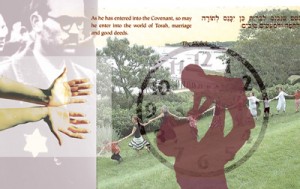Being Jewish
Ritual
Commentary: Covenant

He is 8 days old. With his well-formed features and smooth bright face, he is a handsome little boy. He seems at peace with the world, stretched out on a starched white pillow.
It is 8:30 Thursday morning, the first of Iyar 5771, the fifth of May 2011. There are eight of us on the bima in the small Sefardic synagogue—the boy; his father, my grandson Yair; his grandfathers; three great-grandfathers; and the mohel. The synagogue stands opposite the home of the grandparents, my son Hillel and his wife, Brachah, on the corner of Issachar Street in Jerusalem.
Yair places the child in my arms. I walk the few steps to Yehudah, the maternal grandfather of Yair’s wife, Sharon. Yehudah brings the child to Shlomo, Sharon’s paternal grandfather, seated in the Chair of Elijah. I sit down at his side. He turns to me and whispers, “They didn’t always succeed.”
Shlomo is in his nineties. His father was the hazan of the Altneushul in Prague. Shlomo and his wife, Pninah, went through the camps. Theresienstadt. Auschwitz. Buchenwald.
My grandmother Rosa was deported to Theresienstadt in 1942; she came back to Vienna three years later on the back of an armored vehicle of the Russian army.
Brachah’s father, Yechiel, survived the killing grounds in Hungary and fled to Israel after the war. In the years before his death in Petah Tikva, he taught me melodies he had learned at the tisch of Sholem Leiser of Zanz.
“They failed,” Shlomo repeats. “Sometimes.”
I do not know all of Shlomo and Pninah’s descendents, but they make up at least two minyanim here this day. I look around and take the number of mine: Three sons and their wives and 10 grandchildren and the little boy and his sister and the wives of my older grandsons—more than twice a minyan.
I should not count. The numbers make no sense. A candle flickers in the lamp facing the Ark. Elijah’s fire trembles in the room.
There were four of us who made it across the border from Nazi Austria late in 1938: my father, mother, sister and I. My sister married one of the few survivors of the Janowska death camp; he died a year ago, screaming in his last nights’ sleep: Run. Run.
I nod to my wife, Judy. There are tears in her eyes—not her usual mode. She is tough. She has stuck with me more than 60 years. Judy and her parents were born in America, a Jewishly removed family. Mine was a religiously deeply committed one. Judy joined me on that way. When I came to realize that the only place I could call home was Israel, she took the journey east with me. We arrived in Jerusalem 45 years ago; it would be a trial period, I promised her.
Then on a Friday morning, Judy was in the supermarket on Agron Street, buying halla. My cousin Elitzur waved to her from the far end of the store. A moment later, a grenade exploded at the counter. He saw two mangled bodies carried out. Your wife has been killed, he screamed into the phone. I raced home from my lab at Hadassah Hospital. Judy was black with soot, and very much alive; 8-year-old Josh had pulled the shopping cart over his mother and himself as the ceiling came down.
A week later she took out Israeli citizenship. I followed.
The mohel and yair bend over the sleeping boy. The mohel had been a student but now this is his calling, he confided as we gathered on the bima—ever since his brother was killed in a Palestinian suicide attack.
Yair assists the mohel. He will not delegate the mitzva entirely to another. The boy gives a small cry. There is a drop of blood on Yair’s sleeve.
I shudder. I have seen blood on him before—the front page of the morning paper carried a picture of Yair, blood on shirt and trousers. It was the blood of a friend on a litter he was easing into an ambulance.
Brachah called at dawn. He is alright, he is alright, she cried. They had broken into the yeshiva in Atzmona. Yair was in a study room with friends. The friends fell in a hail of bullets. Yair was barely touched.
The mohel’s voice fills the room: Let his name in Israel be called Itai Amichai.
That seems much for so little a child. But then Amichai is not only the Hebrew for “my people lives.” It also forms an acronym, the letters of the names of the boys who died in Atzmona.
Yair and the mohel chant the words that seal the covenant, and I say them under my breath. And I passed before thee and I saw thee stricken in thy blood, and I said unto thee, in thy blood shalt thou live! And I said unto thee, in thy blood shalt thou live!
The shutters rattle, the door blows open. April weather. No. The thunder of flaming horses drawing Elijah’s chariot into the storm.
David W. Weiss is professor emeritus at the Hebrew University–Hadassah Medical School. The author of hundreds of scientific articles, he has also written on Jewish topics.










 Facebook
Facebook Instagram
Instagram Twitter
Twitter
Leave a Reply